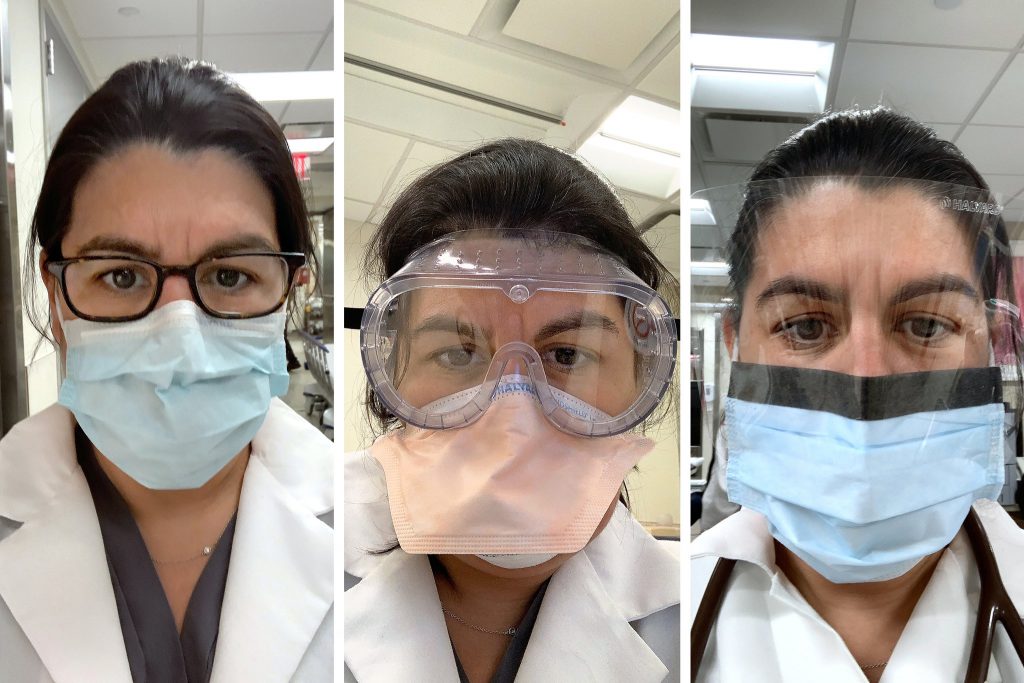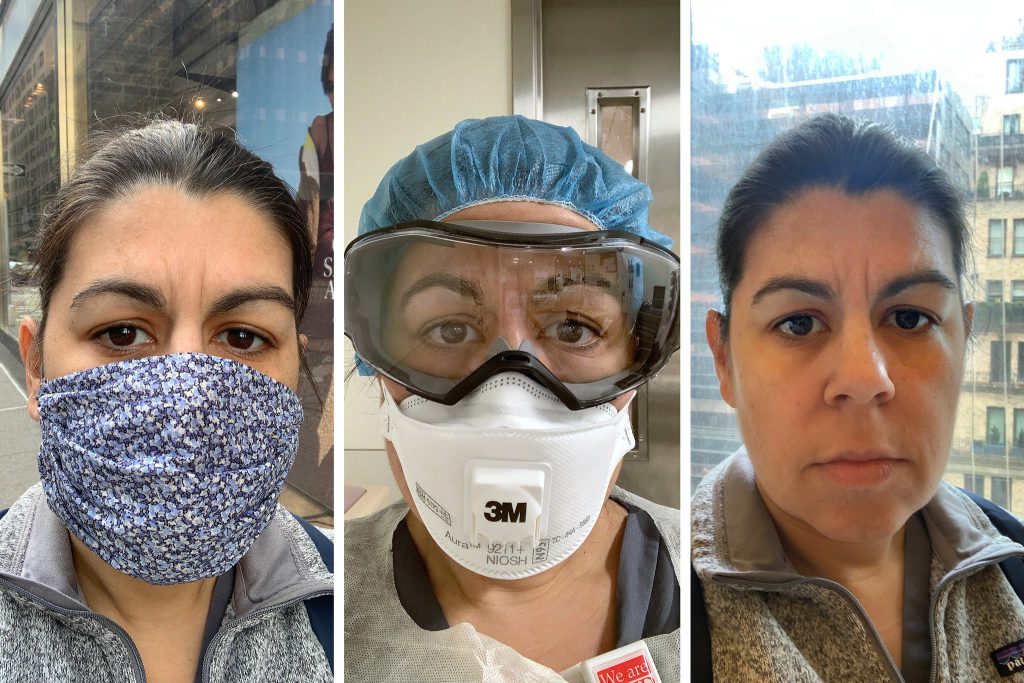Thanking God for My Breath: Dispatch From New York’s Frontline

An E.R. doctor predicted the chaos that Covid-19 would unleash long before it was declared a pandemic. Then she came down with it herself.

“The hospital unit felt ‘like a pressure cooker.’”
— Dr. Dara Kass, associate professor of emergency medicine at Columbia University Medical Center
[In Her Words is available as a newsletter and this profile is part of a series looking at women at the forefront of the fight against coronavirus. Sign up here for more profiles in the weeks ahead.]
One Sunday last month Dr. Dara Kass reported to an emergency room in the Washington Heights neighborhood of Manhattan. In some ways, it was a morning just like any other. She chugged a coffee, scrubbed in, greeted her co-workers. She was sent to an area of the E.R. designated for patients with respiratory issues. And that’s when the morning took a turn — it was Dr. Kass’s first day on coronavirus duty.
Instead of the normal abdominal pains and headaches, nearly every patient that Dr. Kass saw had the same telltale Covid-19 symptoms: cough, fever, shortness of breath. And tensions among the E.R. staff were running high.
Dr. Kass recalled that the hospital unit felt “like a pressure cooker,” all of the physicians and nurses doing their best to stay calm as some speculated about what their work would look like once the number of Covid-19 cases surged.
For Dr. Kass, the pressure had been mounting for weeks. She started worrying about coronavirus long before her neighbors were stockpiling toilet paper and news headlines screamed “pandemic.” Last month she sat down to brunch with friends, who asked casually how her work at the hospital was going. “You guys, this is going to touch all of our lives,” she told the group.
- Help us report in critical moments.
Subscribe today to support The Times
Dr. Kass has always been quick to notice threats to public health. She said that’s because for her, her roles as a physician and as a family caretaker are intertwined. Being an emergency doctor makes her a better mom, she said, because she’s always on the lookout for risks that others might miss. Being a mom makes her a better physician because she pays attention to her patients’ unarticulated needs, the emotional, as well as the physical.
Latest Updates: Coronavirus Outbreak
- Wuhan lifts its lockdown, as Europe charts its next moves.
- How doctors and nurses risked everything as the coronavirus tore through northern Italy.
- Britain is gripped by concern for the health of its prime minister, and questions of succession.
See more updates Updated 3m ago More live coverage: MarketsNew York
But as a doctor, and as a mom, recent weeks have been especially tough. Once news reports began to project a surge of coronavirus cases in New York, Dr. Kass knew that she’d be needed on the front lines. She knew that she’d inevitably be exposed to Covid-19. And she had read that up to 80 percent of clustered infections reported in China were within households, suggesting high intrafamily transmission rates. So she sat down with her three children, ages 12, 10 and 7, and told them that they would need to spend the next several weeks at their grandparents’ house in New Jersey.
It feels unfair, even nonsensical, to be deprived of her source of comfort — her kids — during the most challenging period of her career. But Dr. Kass realizes it’s a sacrifice that comes with her professional territory. “How can we expect health care workers to not hug and kiss their families? But then how can we expect them not to be exposed?” she said. “The choice I made was to not have to look my kids in the eye and say, ‘I won’t hug and kiss you right now.’”
On March 13, Dr. Kass and her husband drove their children across the river to New Jersey. She squeezed them tight and told them to think of the coming months like summer camp with Grandma. Back at home, she began to prepare for her first coronavirus-focused E.R. shift.
Dr. Kass spent 24 hours in the emergency room that weekend. At some point the hours all began to bleed together as she rushed between patients. She took people’s vitals, listened for wheezing and looked for evidence of pneumonia, and offered words of comfort to others in a panic. She was careful to wear gloves, an N-95 mask and goggles. No patients coughed on her directly, and she got home figuring she was safe from infection, for now.
That Monday, Dr. Kass woke up with a jolt of pain shooting up her back. Her whole body felt heavy, fatigued. “Wow, am I so out of shape I can’t work two shifts in a row?” she wondered. She noticed, too, that her senses were blunted; a cup of coffee tasted like water. But she pressed ahead with her day — she had patients to see virtually, using telemedicine, many of them showing coronavirus symptoms, and she didn’t want to cancel.
The next day, Dr. Kass developed a hacking cough. It grew worse by the hour, and her breath began to quicken. Even the thought of walking up a flight of stairs was exhausting; the idea of cycling, as she normally does, was “unfathomable.” She did a telemedicine visit to urgent care and was told to get tested for the virus. Her results came back that Thursday night: positive, Covid-19.

From the moment Dr. Kass began tracking the outbreak, she knew that she would probably get coronavirus. But she didn’t expect to be infected so soon. The hardest part was telling her kids — through her coughs — that she was sick. “Guys, don’t I make coronavirus look good?” she said over FaceTime, trying to make them crack a smile.
Asked how she was feeling days later, Dr. Kass’s answer was straightforward. “Right now I’m getting up and literally thanking God for my breath,” she said. “The same advice I’ve given to my patients is the advice I’m giving myself, which is as long as you can get through this breath you’re OK.”
Last week, Dr. Kass moved into the Four Seasons hotel, in midtown Manhattan, which is offering free accommodations for medical personnel. After her house was cleaned and sanitized, her kids came home on Friday to Brooklyn.
This Sunday, three weeks after her initial exposure in the emergency room, Dr. Kass returned for her first shift post-infection. Three hours into that shift, she got a call with good news: Her antibody test showed she was immune and eligible to donate plasma for Covid-19 clinical trials, which are testing whether blood transfusions from recovered Covid-19 patients can be used for treatment of the disease.
Now, mingled with her relief, Dr. Kass feels a sense of urgent purpose. “Because I’m immune, I feel like I have a sense of responsibility,” she said. “I feel empowered by my own antibodies.”
Readers, do you know of any women affected by and leading the charge against the pandemic? Let us know at inherwords@nytimes.com.
Today’s In Her Words is written by Emma Goldberg and edited by Francesca Donner. Our art director is Catherine Gilmore-Barnes, and our photo editor is Sandra Stevenson.
Did someone forward you this email? Sign up here to get future installments. You can also follow us on Instagram or email us at inherwords@nytimes.com.
-
Latest News
-
Top Posts in April



















Comments